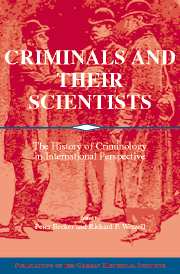Book contents
- Frontmatter
- Introduction
- Part One Nonacademic sites of Nineteenth-Century Criminological Discourse
- 1 The French Revolution and the Origins of French Criminology
- 2 Murderers and “Reasonable Men”: The “Criminology” of the Victorian Judiciary
- 3 Unmasking Counterhistory: An Introductory Exploration of Criminality and the Jewish Question
- 4 Moral Discourse and Reform in Urban Germany, 1880s-1914
- 5 The Criminologists’ Gaze at the Underworld: Toward an Archaeology of Criminological Writing
- Part Two Criminology as Scientific and Political Practice in the Late Nineteenth and Early Twentieth Centuries
- Part Three The Making of the Criminologist
- Part Four Criminology in the First Half of the Twentieth Century: The Case of Weimar and Nazi Germany
- Index
1 - The French Revolution and the Origins of French Criminology
Published online by Cambridge University Press: 05 January 2013
- Frontmatter
- Introduction
- Part One Nonacademic sites of Nineteenth-Century Criminological Discourse
- 1 The French Revolution and the Origins of French Criminology
- 2 Murderers and “Reasonable Men”: The “Criminology” of the Victorian Judiciary
- 3 Unmasking Counterhistory: An Introductory Exploration of Criminality and the Jewish Question
- 4 Moral Discourse and Reform in Urban Germany, 1880s-1914
- 5 The Criminologists’ Gaze at the Underworld: Toward an Archaeology of Criminological Writing
- Part Two Criminology as Scientific and Political Practice in the Late Nineteenth and Early Twentieth Centuries
- Part Three The Making of the Criminologist
- Part Four Criminology in the First Half of the Twentieth Century: The Case of Weimar and Nazi Germany
- Index
Summary
Who will help me read the human heart through its envelopes?
(Louis-Sébastien Mercier)Does the history of French criminology still need to be written? Some recent works assume that it no longer does, but this certainly was not the case a short while ago. Since World War II, criminology has taken a back seat to the issues surrounding criminal law. In fact, at times it has been unclear whether or not criminology had its own history at all. Michel Foucault's famous Discipline and Punish dedicated only a few lines to the subject. Although important works on the history of penitentiary systems followed, Foucault's study did not give rise to new research on criminological science. Most likely, this was because criminology was considered a by-product of the penitentiary system.
Without drawing on any particular theory, I seek to locate the origins of French criminology within the history of the state and the individual by focusing on the impact of the revolutionary period, which has been taken into account in histories of the penal system but has been curiously neglected in the history of criminological knowledge. For it is only by resituating the criminological question in this period that one can try to understand the genesis of the contradictory anthropologies of criminal law and the human sciences, involving the competing postulates of free will and determinism.
- Type
- Chapter
- Information
- Criminals and their ScientistsThe History of Criminology in International Perspective, pp. 25 - 42Publisher: Cambridge University PressPrint publication year: 2006
- 2
- Cited by

